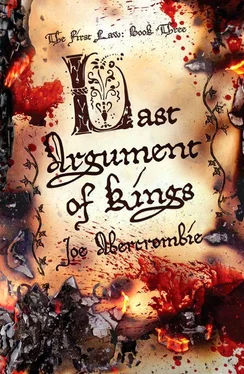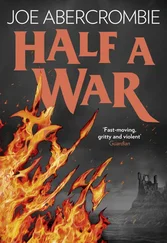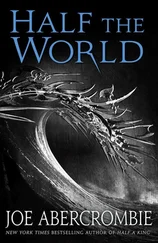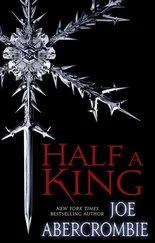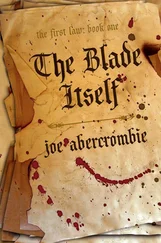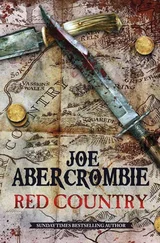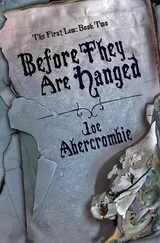Better than floating to the top of the canal after a few days on the bottom, bloated up like a great pale slug and smelling like all the graves in the city. “As good as I’ll get, I suppose. I do wonder, though. What is to stop me having my Practicals follow the scent of expensive perfume after we are done here and finish what they started?”
“It is so very like you to say such a thing.” She sighed. “I should inform you that an old and trustworthy business acquaintance of mine has a sealed letter in his possession. In the event of my death, it will be sent to the Arch Lector, laying out to him the exact nature of my sentence in Dagoska.”
Glokta sucked sourly at his gums. Just what I need, another knife to juggle. “And what will occur if, entirely independently from my actions, you succumb to the rot? Or a house falls on you? Or you choke on a slice of bread?”
She opened her eyes very wide, as though the thought had only just occurred. “In any of those cases… I suppose… the letter would be sent anyway, despite your innocence.” She gave a helpless laugh. “The world is nothing like as fair a place as it should be, in my opinion, and I daresay that the natives of Dagoska, the enslaved mercenaries, and the butchered Union soldiers who you made fight for your lost cause would concur.” She smiled as sweetly as if they were discussing gardening. “Things would probably have been far simpler for you if you’d had me strangled, after all.”
“You read my mind.” But it is far too late now. I did a good thing, and so, of course, there is a price to be paid.
“So tell me, before we part ways again, for what, we can both only hope, will be the last time—are you involved with this business of the vote?”
Glokta felt his eye twitch. “My duties would seem to touch upon it.” Indeed it occupies my every waking hour.
Carlot dan Eider leaned forward to a conspiratorial distance, her elbows on the table, her chin in her hands. “Who will be the next king of the Union, do you suppose? Will it be Brock? Isher? Will it be someone else?”
“A little early to say. I’m working on it.”
“Off you hobble, then.” She pushed out her bottom lip. “And it’s probably better if you don’t mention our meeting to his Eminence.” She nodded, and Glokta felt the bag forced back over his face.
Jezal’s command post, if you could use the phrase in relation to a man as utterly confused and clueless as he felt, was at the crest of a long rise. It offered a splendid view of the shallow valley below. At least, it would have been a splendid view in happier times. As things stood, it had to be admitted, the spectacle was far from pleasant.
The main body of the rebels entirely covered several large fields further down the valley, and a dark, and grubby, and threatening infestation they seemed, glinting in places with bright steel. Farming implements and tradesman’s tools, perhaps, but sharp ones.
Even at this distance there was disturbing evidence of organisation. Straight, regular gaps through the men for the quick movement of messengers and supplies. It was plain, even to Jezal’s unpractised eye, that this was as much an army as a mob, and that someone down there knew his business. A great deal better than he did, most likely.
Smaller, less organised groups of rebels were scattered far and wide across the landscape, each one a considerable body in its own right. Men sent foraging for food and water, picking the country clean. That crawling black mass on the green fields reminded Jezal of a horde of black ants crawling over a pile of discarded apple peelings. He had not the slightest idea how many of them there were, but it looked at this distance as though forty thousand might have been a considerable underestimate.
Down in the village in the bottom of the valley, behind the main mass of rebels, fires were burning. Bonfires or buildings it was hard to say, but Jezal rather feared the latter. Three tall columns of dark smoke rose up and drifted apart high above, giving to the air a faint and worrying tang of fire.
It was a commander’s place to set a tone of fearlessness which his men would not be able to help but follow. Jezal knew that, of course. And yet, looking down that long, sloping field, he could not help but reflect on the very great number of men at the other end, so ominously purposeful. He could not stop his eyes from darting back towards their own lines, so thin, meagre, and uncertain-seeming. He could not avoid wincing and tugging uncomfortably at his collar. The damn thing still felt far too tight.
“How do you wish the regiments deployed, sir?” asked his adjutant, Major Opker, with a look which somehow managed to be both condescending and sycophantic all at once.
“Deployed? Er… well…” Jezal racked his brains for something vaguely appropriate, let alone correct, to say. He had discovered early in his military career that if one has an effective and experienced officer above, coupled with effective and experienced soldiers below, one need do, and know, nothing. This strategy had stood him in fine stead for several comfortable peacetime years, but its one shortcoming was now starkly laid bare. If by some miracle one rises to complete command, the system collapses entirely.
“Deployed…” he growled, furrowing his brow and trying to give the impression he was surveying the ground, though he had only a hazy idea what that even meant. “Infantry in double line…” he ventured, remembering a fragment of some story Collem West had once told him. “Behind this hedgerow here.” And he slashed his baton portentously across the landscape. The use of a baton, at least, he was expert in, having practiced extensively before the mirror.
“In front of the hedgerow, the Colonel means to say, of course,” threw in Bayaz smoothly. “Infantry deployed in double line to either side of that milestone. The light cavalry in the trees there, heavy cavalry in a wedge on the far flank, where they can use the open field to their advantage.” He displayed an uncanny familiarity with military parlance. “Flatbows in a single line behind the hedgerow where they will at first be hidden from the enemy, and can give them plunging fire from the high ground.” He winked at Jezal. “An excellent strategy, Colonel, if I may say.”
“Of course,” sneered Opker, turning away to give the orders.
Jezal gripped tight to his baton behind his back, rubbing nervously at his jaw with the other hand. Evidently there was a lot more to command than simply being called “sir” by everyone. He would really have to read some books when he got back to Adua. If he got back.
Three small dots had detached themselves from the crawling mass of humanity down in the valley and started moving up the rise toward them. Shading his eyes with his hand, Jezal could just see a shred of white moving in the air above them. A flag of parley. He felt Bayaz’ decidedly uncomforting hand on his shoulder.
“Don’t worry, my boy, we are well prepared for violence. But I feel confident it will not come to that.” He grinned down at the vast mass of men below. “Very confident.”
Jezal ardently wished he could have said the same.
For a famous demagogue, traitor, and inciter of riots, there was nothing in the least remarkable about the man known as the Tanner. He sat calmly in his folding chair at the table in Jezal’s tent, an ordinary face under a mop of curly hair, a man of medium size in a coat of unexceptional style and colour, a grin on his face that implied he knew very well that he held the upper hand.
“They call me the Tanner,” he said, “and I have been nominated to speak for the alliance of the oppressed, and the exploited, and the put-upon down in the valley. These are two of my partners in this righteous and entirely patriotic venture. My two generals, one might say. Goodman Hood,” and he nodded sideways at a burly man with a shovel beard, a ruddy complexion, and a seething frown, “and Cotter Hoist,” and he jerked his head the other way towards a weaselly type with a long scar on his cheek and a lazy eye.
Читать дальше
